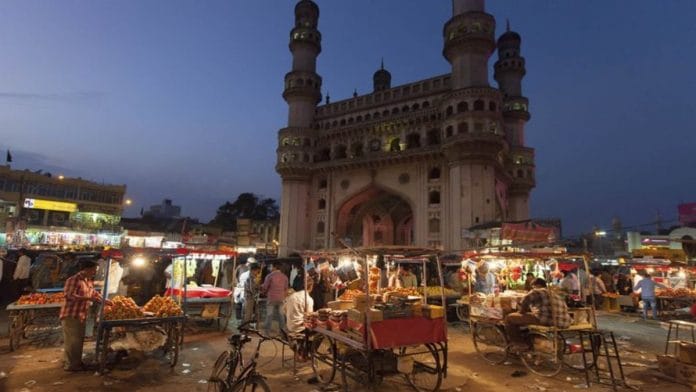If you ask anyone from Hyderabad what makes them a Hyderabadi, the general answer will likely be a love for Irani chai, Biryani, or something along those lines. It might even be the city’s spoken language—Dakhni—which is just waiting to roll off their tongues, regardless of ethnicity or religion. There is a sense of belonging and comfort that binds most of Hyderabadis together.
However, if you dig deeper, the identity of each Hyderabadi is actually a bit more complex. Not because it is difficult to define, but because the city, in spite of its diversity, has always maintained at least a subterfuge of a shared culture among its people.
And that is where Daneesh Majid’s book The Hyderabadis: From 1947 to the Present Day comes in—it helps fill some of the gaps many Hyderabadis have about their identity. Founded in the 16th century by people of Iranian origin (the Qutb Shahi dynasty), who were more than happy to embrace the local Telugu culture, Hyderabad has a wide mix of communities, whose trajectory has changed due to several vicissitudes, especially after Hyderabad’s annexation to India on 17 September 1948.
Hyderabad has been written about more by outsiders who settled here than by its own people—it’s just an observation and isn’t born out of xenophobia. That’s why Daneesh’s book is important—it not only provides social-political context, but also throws light on how ordinary people have lived through the city’s ever-changing landscape post-Independence.
This is a city founded by a Shia-Muslim dynasty (Qutb Shahis, 1518-1687), then came under the Mughals (1526-1857), after which the Asaf Jahi Nizams were appointed as governors (1724-1948). And in between, all kinds of people have called this city home—Muslims, Hindus, Christians, and Sikhs.
In terms of ethnicity, people are often surprised to learn about the presence of Yemeni, Parsi, and even African (Ethiopian) communities that have lived here for generations, maintaining their own distinct spaces.
Also read: The Kayasthas of Hyderabad—why they were a key part of every Nizam’s administration
Ignored history, nostalgia for Nizam
Of the many books I have read about Hyderabad, Daneesh’s stands out for its ethnographic study of the city’s people. He also writes about the small but important Hindu Kayastha community, which migrated to Hyderabad in the 18th and 19th centuries under the Nizams and held many important positions in the administration.
Another topic that many Hyderabadis have stopped talking about due to generational trauma is Operation Polo—the military action through which Hyderabad was annexed to India in 1948. People forget that during this time, the Communist Party of India (CPI) controlled large parts of Telangana (1947-51) and waged waging a war against feudal landlords who oppressed peasants—the Telangana Armed Struggle.
While working on this subject myself, I noticed how many accounts either brush aside or downplay the fact that the Indian Army was also sent also to crush this peasant rebellion, which was finally called off in October 1951. The Hyderabad State under its last Nizam was one of the largest in the subcontinent, covering 82,698 square miles and comprising what is now Telangana, along with parts of Maharashtra and Karnataka (a total of 16 districts).
Daneesh’s book doesn’t just offer historical insight, —it also helps readers understand contemporary patterns of migration among Hyderabadis. After Operation Polo, a section of Muslims slowly began migrating to the Middle East for work, while Telugu people have long chased the American dream in search of better opportunities.
And, of course, one sentiment that is both interesting and amusing—and which the book highlights—is the deep respect many in Hyderabad, especially the older generation, still have for the last Nizam, Osman Ali Khan.
Though controversial for refusing to join either India or Pakistan after Independence and eventually having his state annexed, he still evokes a deep sense of respect and nostalgia. The monarchy may be long gone, but traces of that sentiment remain. Daneesh’s The Hyderabadis offers a healthy dose of that nostalgia while also helping readers understand what it means to be a modern Hyderabadi today.
Yunus Lasania is a Hyderabad-based journalist whose work primarily focuses on politics, history and culture. He tweets @YunusLasania. Views are personal.
(Edited by Prashant)







These may define the identity of hyderabad Muslims but not that of Hindus living in Hyderabad. Nothing to be greatly proud of the nizam which left Telangana and the Hyderabad-Karnataka region of karnataka highly impoverished and under-developed.
You couldn’t be more biased Mr.Yunus.Terming Operation polo as “generational trauma” while selectively forgetting the atrocities afflicted by Razakars on mostly hindus which were indirectly supported by Nizam is quite revealing of how biased you are.You say the last Nizam is deeply admired which I think is a a bunch of nonsense I dare you ask anyone in Hyderabad whose grandfathers and great grandfathers were butchered just because they were hindu(mostly lower castes including my
grandfather) what do they think of your admired Last Nizam and you speak as if muslims here aren’t telugus you may not consider consider yourself a telugu but I know many muslims who proudly consider themselves as telugus do not speak when you don’t know about something That’s it I hope you will be less biased when you write next time